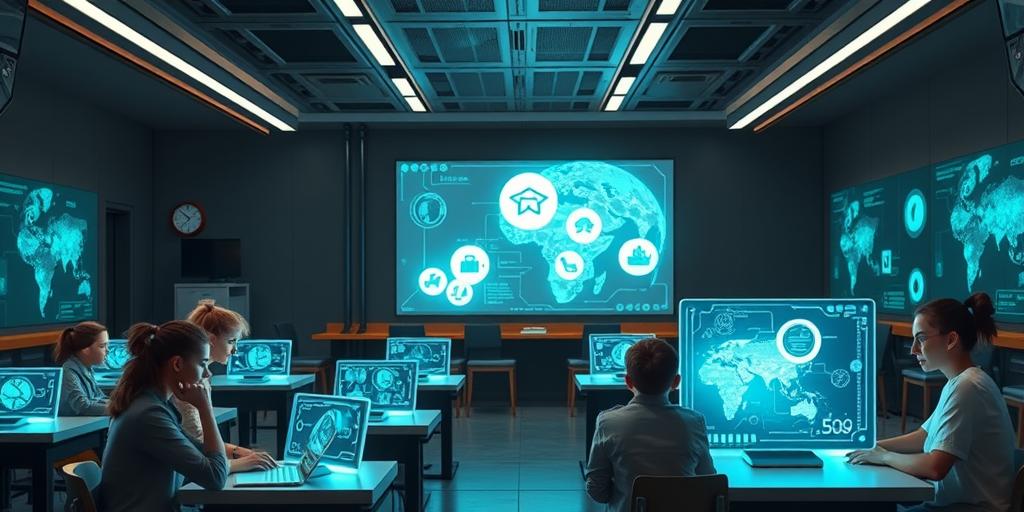The Evolving Landscape of Education: Trends Shaping the Future
The realm of education is in constant flux, adapting to technological advancements, societal shifts, and evolving pedagogical approaches. As we gaze into the future, several key trends emerge as pivotal forces shaping how we learn and teach. Understanding these trends is crucial for educators, students, and anyone invested in the future of education. Let's explore the transformative trends that promise to revolutionize the educational experience.
1. Personalized Learning: Tailoring Education to Individual Needs
Personalized learning is gaining traction as educators recognize the diverse learning styles and paces of students. This approach leverages data analytics and adaptive technologies to create customized learning paths for each student. Instead of a one-size-fits-all curriculum, personalized learning focuses on individual strengths, weaknesses, and interests.
- Adaptive Technologies: AI-powered platforms that adjust content difficulty based on student performance.
- Personalized Feedback: Timely and specific feedback to guide student progress.
- Student Agency: Empowering students to take ownership of their learning goals.
2. Blended Learning: Integrating Online and Offline Experiences
Blended learning combines traditional classroom instruction with online resources to create a more engaging and flexible learning environment. This model allows students to access a wider range of materials and collaborate with peers both in person and virtually.
- Online Modules: Digital content that supplements classroom lessons.
- Virtual Collaboration: Utilizing online tools for group projects and discussions.
- Flipped Classrooms: Students review materials online before class, using class time for deeper exploration and application.
3. Emphasis on Skills-Based Education
As the job market evolves, there's a growing emphasis on skills-based education. Rather than solely focusing on theoretical knowledge, educators are prioritizing the development of practical skills that are directly applicable to real-world scenarios.
- Critical Thinking: Encouraging students to analyze information and solve problems.
- Collaboration: Fostering teamwork and communication skills.
- Creativity and Innovation: Nurturing the ability to generate new ideas and approaches.
4. Gamification: Making Learning Fun and Engaging
Gamification infuses game-like elements into the learning process to increase student motivation and engagement. By incorporating points, badges, leaderboards, and challenges, educators can transform mundane tasks into enjoyable experiences.
- Game-Based Learning Platforms: Educational games that reinforce key concepts.
- Interactive Simulations: Virtual environments that allow students to apply their knowledge in realistic scenarios.
- Reward Systems: Incentives that recognize and celebrate student achievements.
5. Virtual and Augmented Reality: Immersive Learning Experiences
Virtual Reality (VR) and Augmented Reality (AR) technologies are opening up new possibilities for immersive learning experiences. VR transports students to virtual environments, while AR overlays digital content onto the real world. These technologies can enhance understanding, retention, and engagement.
- Virtual Field Trips: Exploring historical sites or natural wonders from the classroom.
- Interactive Simulations: Experiencing complex concepts in a tangible and engaging way.
- Hands-On Training: Practicing real-world skills in a risk-free virtual environment.
6. Artificial Intelligence (AI) in Education: Intelligent Assistance
AI is poised to play a significant role in education, from automating administrative tasks to providing personalized learning support. AI-powered tools can analyze student data, offer customized feedback, and even create intelligent tutoring systems.
- Automated Grading: AI algorithms that streamline the assessment process.
- Personalized Tutoring: AI tutors that provide customized support and guidance.
- Predictive Analytics: AI tools that identify students at risk of falling behind.
Conclusion: Embracing the Future of Education
The future of education is bright, filled with innovative approaches and transformative technologies that promise to enhance the learning experience. By embracing these trends and adapting our educational practices, we can empower students to thrive in an ever-changing world. As we move forward, it's essential to prioritize personalized learning, skills-based education, and the integration of technology to create a more engaging, effective, and equitable educational system for all.









